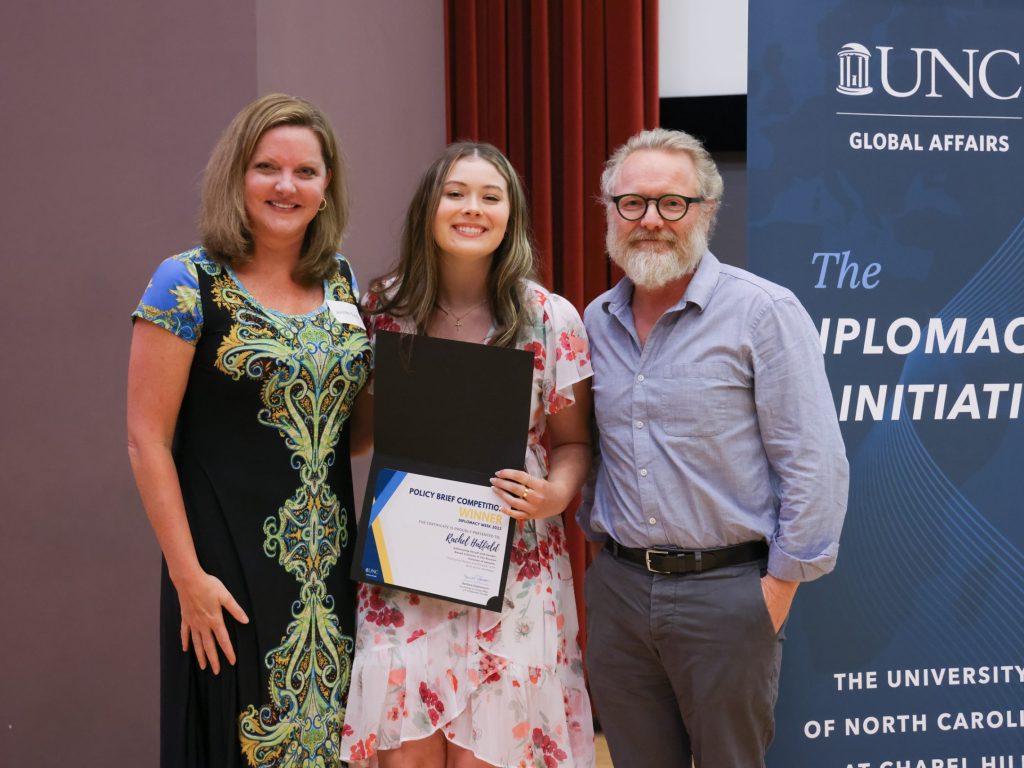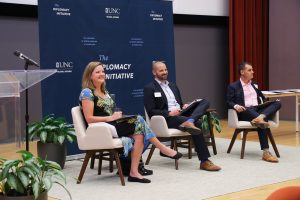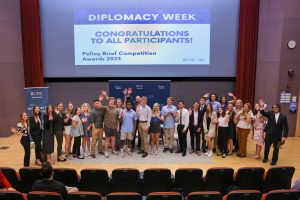Students Explore Global Problem Solving in Second-Annual Diplomacy Week
May 9, 2023
UNC Global Affairs
 Jennifer Davis (left) and Graeme Robertson (right) pose with Policy Brief Competition winner Rachel Hatfield (center). (Photo by Ken Huth)
Jennifer Davis (left) and Graeme Robertson (right) pose with Policy Brief Competition winner Rachel Hatfield (center). (Photo by Ken Huth)
During UNC-Chapel Hill’s second-annual Diplomacy Week April 17-21, students learned about cultural diplomacy, including its role in U.S.-China relations, and the role of diplomacy in solving global challenges such as climate change. They also explored careers in international affairs and showcased their global problem-solving skills.
Rachel Hatfield ’25, a political science major, was selected as the winner of this year’s Policy Brief Competition. Part of Diplomacy Week, the competition challenges Carolina students to prepare visually appealing, concise policy briefs that recommend solutions to pressing global issues. Hatfield’s brief, titled “Addressing Sexual and Gender-Based Violence in the Russian Invasion of Ukraine,” was selected by a panel of three alumni and a UNC-Chapel Hill faculty member.
“I was struck by the testimonies of women who experienced violence in Ukraine firsthand,” said Hatfield. “I immediately knew I wanted to explore how policymakers could fulfill our collective political and ethical obligations to them and their families.”

This year’s panel of judges included Jeffrey Brown MA ’15, a science & technology policy executive for IBM’s Government and Regulatory Affairs; Jennifer Davis ’94, J.D. ’97, a career Foreign Service officer currently serving as the chief of staff to the U.S. ambassador to the United Nations; Ned Kelly ’05, a senior intelligence officer at the Defense Intelligence Agency’s office of technology and long-range analysis; and Brigitte Seim, a faculty member with positions in the Curriculum in Global Studies, the Department of Political Science and the Department of Public Policy.
“Your papers were extraordinary,” said Davis to the students. “I’ve looked at a lot of policy papers in my career. I’ve written them, and I’ve read them. I was so impressed, and we all were, with your papers,” said Davis.
The judges reviewed 17 submissions from nearly 50 students, some working in teams and some working individually. Students initially submitted briefs as part of their coursework, and a group of semi-finalists were then selected by their instructors: Erinn Whitaker (PWAD 250: Introduction to Peace and Security Studies), Tricia Sullivan (PLCY 110: Global Policy Issues), Robert Jenkins (POLI 89: Global Politics of Climate Change) and Graeme Robertson (POLI 235: Politics of Russia and Eurasia).

Six briefs were selected as finalists, and each received an award of $500. Funding for the awards is made possible through the Chancellor’s Global Education Fund.
Barbara Stephenson, Carolina’s vice provost for global affairs, opened the ceremony. As a former U.S. ambassador, she has first-hand experience addressing global challenges.
“The knowledge that you’ve gained and the skills that you’ve sharpened in critical analysis, concise and compelling writing, and creative and collaborative problem solving are skills directly connected to labor market data, skills that employers across multiple sectors and industries are seeking,” said Stephenson. “These skills will equip you, tomorrow’s leaders, to thrive in the workforce and take your place in the next generation of problem solvers.”
Following the awards ceremony, attendees gathered in a reception to network with the judges, as well as community members and alumni working in international affairs, such as Joyce Namde, a career foreign service officer, and Jonathan Flaspoehler ’08, director of corporate development and strategy at Wolfspeed.
Throughout Diplomacy Week, there were many other opportunities for students to learn and apply skills needed for solving global challenges. The week included information sessions about the prestigious Fulbright U.S. Student Program and internships and careers at the U.S. State Department, hosted by Diplomat in Residence Andy Sisk. A panel of Carolina students also shared their experiences as climate change advocates at the 2022 United Nations Climate Change Conference (COP27) in Sharm El Sheikh, Egypt. The week culminated with an evening devoted to cultural diplomacy and a screening of the award-winning documentary, “Beethoven in Beijing,” followed by a Q&A with the filmmaker.
One aim of the Diplomacy Initiative is to bridge the distance between Carolina and the world of diplomacy in Washington, D.C. As Diplomacy Week took place, two foreign ambassadors visited campus. Christina Markus Lassen, ambassador of Denmark to the U.S., discussed Denmark’s strong alliance with the U.S. and its “green transformation” with students in the Trans-Atlantic Masters program. Taranjit Singh Sandhu, ambassador of India to the U.S, met with Chancellor Kevin Guskiewicz and other campus leaders to explore avenues for greater UNC-Chapel Hill engagement with India.
Diplomacy Week is part of UNC-Chapel Hill’s Diplomacy Initiative, which expands opportunities for Carolina students and faculty to learn, teach and apply diplomacy skills used in solving global challenges.
